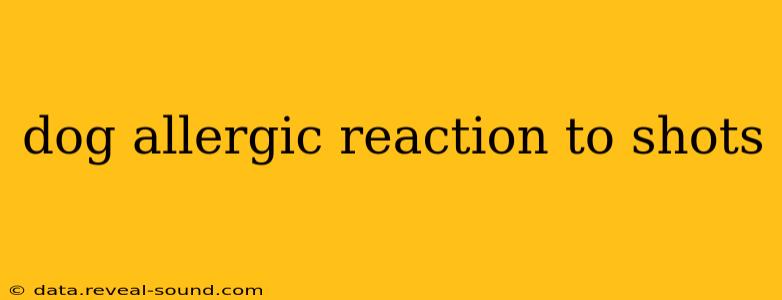Giving your canine companion vaccinations is a crucial part of preventative healthcare. However, just like humans, dogs can experience allergic reactions to these injections. Understanding the signs, treatment, and prevention of these reactions is vital for responsible pet ownership. This comprehensive guide will explore everything you need to know about dog allergic reactions to shots.
What are the Signs of an Allergic Reaction in Dogs After a Shot?
Recognizing the symptoms of an allergic reaction is the first step in providing appropriate care. Reactions can range from mild to severe, and the speed of onset can vary. Mild reactions might manifest as:
- Localized swelling: A small, localized swelling at the injection site is relatively common and often resolves on its own.
- Mild itching: Some dogs experience mild itching around the injection site.
- Slight lethargy: A temporary period of reduced energy.
More severe reactions are a cause for immediate veterinary concern and can include:
- Hives (urticaria): Raised, red, itchy welts appearing on the skin.
- Facial swelling: Swelling around the eyes, muzzle, or lips.
- Respiratory distress: Difficulty breathing, coughing, wheezing, or rapid breathing.
- Vomiting and diarrhea: Gastrointestinal upset.
- Collapse: Loss of consciousness.
- Anaphylaxis: A life-threatening, systemic allergic reaction requiring immediate emergency veterinary care. This is characterized by severe swelling, difficulty breathing, and circulatory collapse.
What Causes Allergic Reactions to Shots in Dogs?
Allergic reactions to vaccines occur when a dog's immune system overreacts to a component of the vaccine. This can be a protein in the vaccine itself, a preservative, or even a contaminant. The exact cause can be difficult to pinpoint, and some dogs may be predisposed to developing these reactions due to underlying sensitivities or genetic factors. Certain vaccines, while incredibly safe for the majority of dogs, carry a slightly higher risk of causing adverse reactions than others. Your vet can discuss the potential risks associated with any particular vaccine.
How Are Allergic Reactions to Shots Treated in Dogs?
Treatment depends on the severity of the reaction. Mild reactions often require no specific treatment and resolve spontaneously. However, monitoring your dog closely is essential.
For moderate to severe reactions, immediate veterinary intervention is crucial. Treatment may include:
- Antihistamines: To reduce itching and swelling.
- Corticosteroids: To suppress the immune response and reduce inflammation.
- Epinephrine (adrenaline): In cases of anaphylaxis, epinephrine is administered to counteract the effects of the allergic reaction and is often life-saving.
- Fluid therapy: To support blood pressure and hydration, especially in cases of shock.
- Oxygen therapy: To assist breathing in cases of respiratory distress.
My Dog Had a Reaction to a Shot. Should I Avoid Future Vaccinations?
No, you should not necessarily avoid future vaccinations. While a reaction can be alarming, the benefits of vaccination far outweigh the risks for most dogs. Discuss your concerns with your veterinarian. They may recommend:
- Desensitization: A process of gradually introducing small amounts of the allergen to build tolerance.
- Different vaccine formulation: Switching to a different brand or type of vaccine may reduce the risk of future reactions.
- Pre-medication: Administering antihistamines or other medications before vaccination to prevent a reaction.
What Can I Do to Prevent Allergic Reactions in My Dog?
Preventing allergic reactions isn't always possible, but you can take steps to minimize the risk:
- Discuss your dog's history: Inform your veterinarian about any previous allergic reactions or sensitivities your dog has experienced.
- Closely monitor your dog: Observe your dog closely after vaccinations for any signs of an allergic reaction.
- Follow your vet's instructions: Carefully follow your veterinarian's instructions regarding vaccinations and post-vaccination care.
Can a Dog Have an Allergic Reaction Days After a Shot?
While most reactions occur within minutes to hours of vaccination, some delayed reactions can appear within a few days. These are less common but still possible. Any concerning symptoms that develop in the days following a vaccination should be reported to your veterinarian immediately.
Is there a test to determine if my dog is allergic to vaccines?
There isn't a single definitive test to predict whether a dog will have an allergic reaction to a specific vaccine. However, your vet can discuss your dog's history, assess risk factors, and consider pre-vaccination allergy testing in certain situations.
This information is for educational purposes only and should not be considered medical advice. Always consult your veterinarian for any health concerns regarding your dog. They can provide personalized guidance based on your dog's individual needs and health history.
